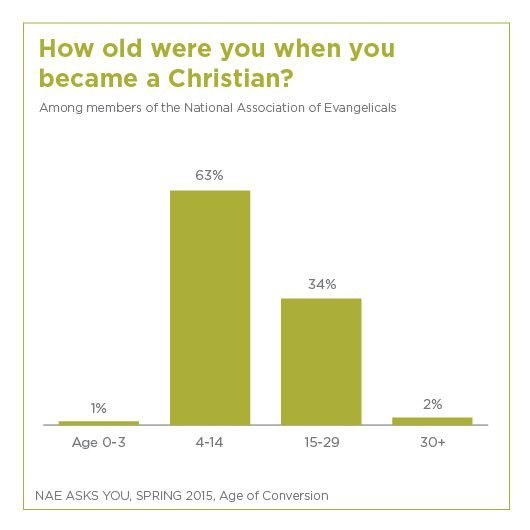
My friend Gary recently mentioned a National Association Evangelical (NAE) article about when Americans become born-again (Evangelical) Christians. Here’s what the NAE post had to say:
Thirteen is the average age that members of the National Association of Evangelicals (NAE) became Christians, according to the NAE’s (2015) spring poll. The median age when NAE members became Christians is 11.
Evangelicals believe that salvation is made possible through the death and resurrection of Jesus Christ and the regeneration of the Holy Spirit. Each person is invited to accept God’s forgiveness, which is freely offered to all who believe.
The majority of the respondents (63 percent) accepted Jesus Christ as Savior and Lord while they were 4-14 years old, in what is known as the 4/14 Window.
The 4/14 Window describes the opportunity for evangelization within the 4-14 age range, suggesting that most people who become Christians do so during those ages. A 2004 Barna Group study indicated that nearly half of all Americans who accept Jesus Christ as their Savior do so before reaching the age of 13 (43 percent), and that two out of three born again Christians (64 percent) made that commitment to Christ before their 18th birthday.
Responses of the NAE Asks You poll ranged from six weeks old to 50 years old. The NAE member with the six-week old conversion noted that his tradition holds to baptismal regeneration, which links salvation to the rite of baptism. The person who came to Christ at 50 was also baptized as an infant, but said that he fell away for many years, became a Christian later in life, and now serves as a pastor.
While the poll revealed a few denominational distinctives regarding salvation, comments provided by NAE members demonstrated the unique ways in which individuals come to saving faith. Some became Christians through the ministry of the Good News Club, InterVarsity, Vacation Bible Schools and revivals. Several people identified the specific place of their conversion from the kitchen table or grandmother’s home to the campfire of a Christian camp or altar of a local church. Many noted the family member, pastor or friend who led them to the Lord. And there are some who can not recall a specific date or place, echoing one respondent: “I can’t remember a time in my life where I did not identify as a Christian.”
Most Evangelicals make salvation decisions between the ages of 4 and 14. Astoundingly, 98% of Evangelicals asked Jesus to save them before the age of 30. In other words, “we must get them while they are young, or we won’t get them at all.” This is why Evangelical churches have Sunday schools, youth programs, children’s churches, vacation Bible schools, and sundry other programs used to “hook” salvation prospects while they are young. The older a person becomes, the more likely it is that they will not get saved; that they will reject in part or out of hand the claims made by Evangelical sects, pastors, and parents. Once children reach their teenage years, it becomes increasingly hard to evangelize them. Why? They can think for themselves. They are developing critical thinking skills. They are more skeptical about the religious claims made by their pastors and parents.
Are you a former Evangelical? Or a current one, for that matter? At what age did you first profess faith in Jesus? Did you have multiple salvation experiences? Please share your thoughts in the comment section.
Bruce Gerencser, 66, lives in rural Northwest Ohio with his wife of 45 years. He and his wife have six grown children and thirteen grandchildren. Bruce pastored Evangelical churches for twenty-five years in Ohio, Texas, and Michigan. Bruce left the ministry in 2005, and in 2008 he left Christianity. Bruce is now a humanist and an atheist.
Connect with me on social media:
Your comments are welcome and appreciated. All first-time comments are moderated. Please read the commenting rules before commenting.
You can email Bruce via the Contact Form.
